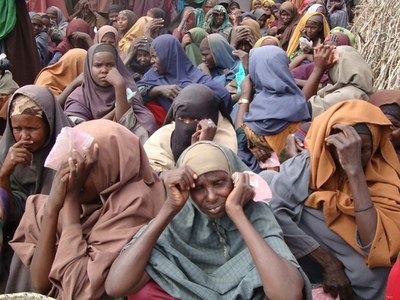Somalia: Rains bring mixed fortunes for famine victims

Seasonal rains have begun in Somalia’s capital Mogadishu, adding to the problems for thousands of families already suffering the effects of the famine and the closure of the SOS hospital for security reasons.
The only free hospital in the country, the SOS hospital provided life-saving treatments for 500 people every single day. Following violent conflict between government troops and the Al-Shabab group which took place on the hospital grounds, staff and patients were evacuated and the hospital remains inaccessible to the public.
In the midst of the conflict, patients, including women who had recently given birth and malnourished children, were forced to flee. According to SOS Hospital medical personnel “few of the 348 severely malnourished children under-five who were in the care of the hospital’s therapeutic feeding unit managed to make their way” to the SOS Emergency Medical Centre at Badbado 10km away, “the majority did not, as a result, they can be presumed dead”.
Of the 500 patients who would normally attend the SOS Hospital in the Somali capital every day, “only the lucky” have managed to overcome strict movement restrictions that prevent them from finding alternative healthcare in Mogadishu. The ongoing famine in Somalia has led to a sharp increase in malnourishment and associated health problems.
SOS Children are doing everything possible to address the dire health needs within the communities in and around Mogadishu. Talks with authorities have resulted in a relaxing of movement restrictions. The most vulnerable women and children are now encouraged to cross the city and attend the SOS Medical Centre, at the Badbado Internally Displaced Persons (IDP) camp.
Mogadishu’s poorest residents, many who have migrated to the area in search of food, take shelter from the rain in igloo shaped huts made of sticks and covered by a tapestry of plastic bags. The most vulnerable succumb to the cold conditions, while others lack the strength to survive diseases such as cholera and malaria that thrive in muddy unhygienic environments
However, the rains also bring hope for the five thousand displaced Somalis who have received treatment in recent months at the SOS Clinic in the Badbado camp. With improved health and better farming weather, they are eager to plant the crops that will feed them in the coming year. A team from SOS Children are helping families with food vouchers to purchase supplies until their crops come to fruition.
SOS Children are also working in central Somalia to support families suffering the effects of the famine. On 20 September, a committee of the Al-Shabab group instructed all of the 12,000 displaced families at the Baidoa refugee camp to return home. Prior to their departure SOS staff provided 6,000 of the most needy people with food for one month. We have kept in contact with 11,000 families to establish ways in which we can continue to meet their needs.
We have hoping to reopen the hospital in Mogadishu as soon as it is safe. Read more about our Emergency Relief Programme in Somalia and how you can help.

 Return to Schools Wikipedia Home page…
Return to Schools Wikipedia Home page…
